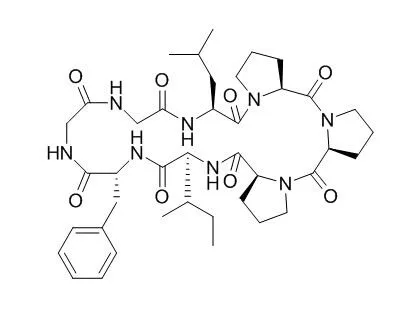The present study aimed to measure the effect of Heterophyllin B (HB) on the adhesion and invasion of ECA-109 human esophageal carcinoma cells, and examine the possible mechanism involved.
METHODS AND RESULTS:
A Cell Counting kit 8 assay was performed to determine the cell viability. Cell adhesion and invasion were determined following treatment of the ECA-109 cells with HB (0, 10, 25 and 50 μM) for 24 h. The levels of phosphorylated (p-)ATK and p-phosphoinositide 3-kinase (PI3K), and the protein levels of β-catenin were measured using western blot analysis. The mRNA and protein expression levels of E-cadherin, vimentin, snail, matrix metalloproteinase (MMP)2 and MMP9 were detected using reverse transcription-quantitative polymerase chain reaction and western blot analyses, respectively. HB (10, 25 and 50 μM) significantly suppressed the adhesion and invasion of the ECA-109 human esophageal carcinoma cells in a dose-dependant manner. The expression levels of p-ATK, p-PI3K and β-catenin were markedly decreased. The expression of E-cadherin was promoted, whereas the expression levels of snail, vimentin, MMP 2 and MMP 9 were decreased significantly in the ECA-109 cells treated with HB. In addition, HB inhibited the adhesion and invasion induced by PI3K activating peptide in the ECA-109 cells, and the protein expression levels were also adjusted.
CONCLUSIONS:
These results suggested that HB effectively suppressed the adhesion and invasion of the human esophageal carcinoma cells by mediating the PI3K/AKT/β-catenin pathways and regulating the expression levels of adhesion- and invasion-associated genes. |






 Cell. 2018 Jan 11;172(1-2):249-261.e12. doi: 10.1016/j.cell.2017.12.019.IF=36.216(2019)
Cell. 2018 Jan 11;172(1-2):249-261.e12. doi: 10.1016/j.cell.2017.12.019.IF=36.216(2019) Cell Metab. 2020 Mar 3;31(3):534-548.e5. doi: 10.1016/j.cmet.2020.01.002.IF=22.415(2019)
Cell Metab. 2020 Mar 3;31(3):534-548.e5. doi: 10.1016/j.cmet.2020.01.002.IF=22.415(2019) Mol Cell. 2017 Nov 16;68(4):673-685.e6. doi: 10.1016/j.molcel.2017.10.022.IF=14.548(2019)
Mol Cell. 2017 Nov 16;68(4):673-685.e6. doi: 10.1016/j.molcel.2017.10.022.IF=14.548(2019)